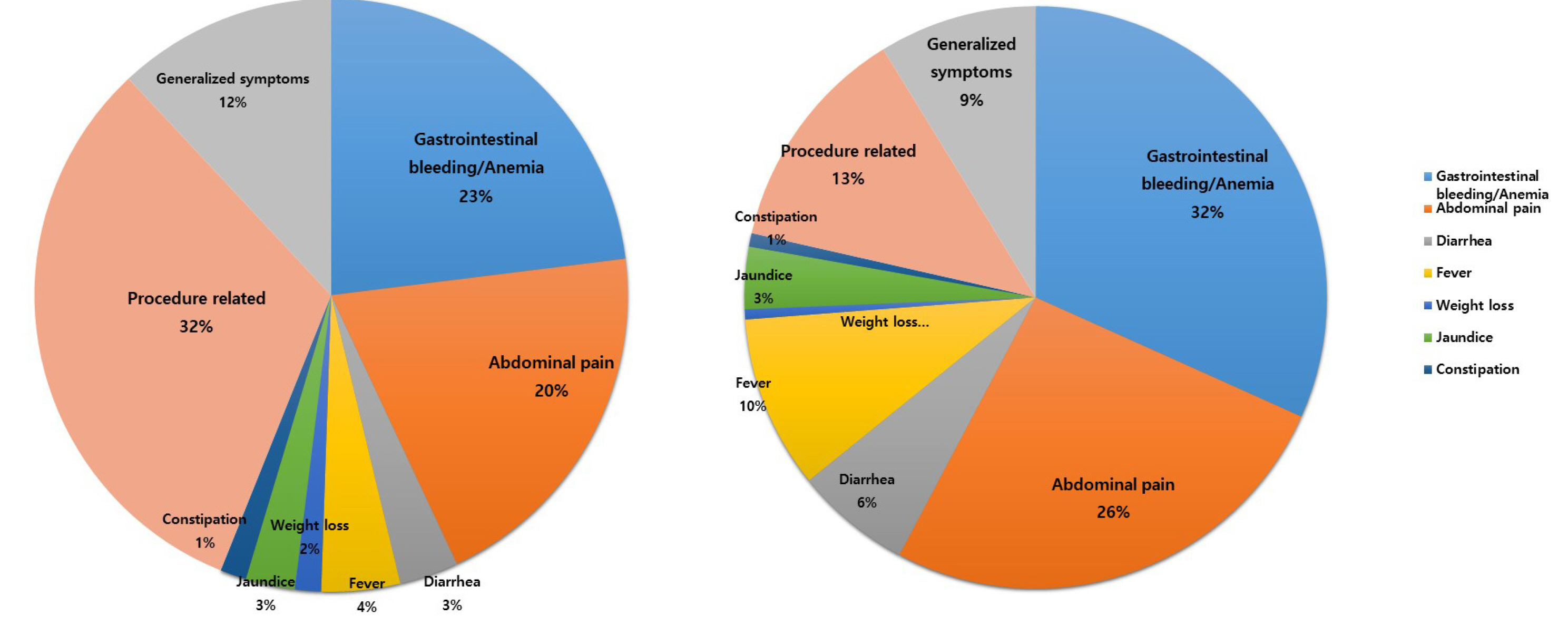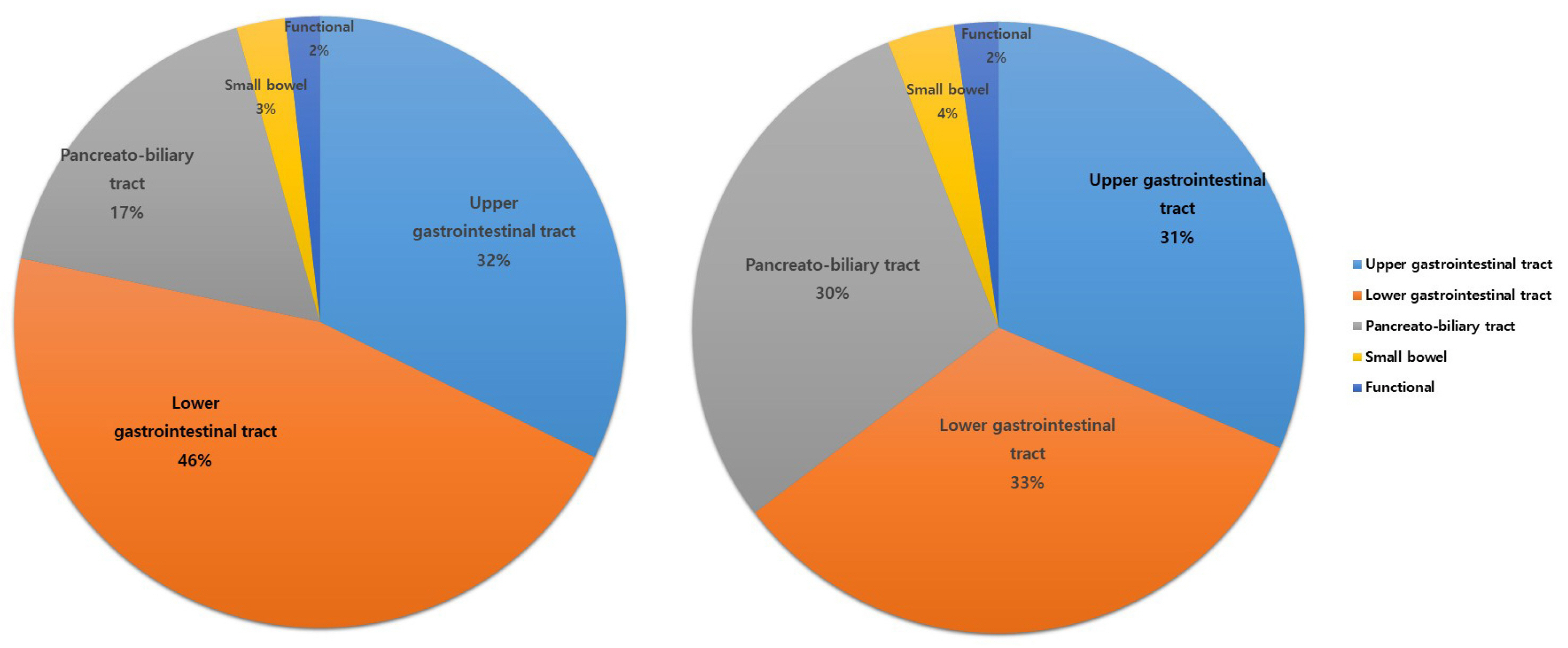Korean J Gastroenterol.
2022 Jun;79(6):244-251. 10.4166/kjg.2022.032.
Gastrointestinal Disease in the Population Aged 80 Years and above in Korea during Recent Decades: Multi-center Cross-sectional Study
- Affiliations
-
- 1Department of Internal Medicine, St. Vincent Hospital, College of Medicine, the Catholic University of Korea, Suwon, Korea
- 2Department of Internal Medicine, Incheon St. Mary's Hospital, College of Medicine, the Catholic University of Korea, Incheon, Korea
- 3Department of Internal Medicine, Uijeongbu St. Mary's Hospital, College of Medicine, the Catholic University of Korea, Uijeongbu, Korea
- KMID: 2530697
- DOI: http://doi.org/10.4166/kjg.2022.032
Abstract
- Background/Aims
Globally, the population aged 80 years or older is growing faster due to the rising life expectancy. Korea has already entered into an advanced aged society, and a post-aged society is expected in 2025. This study evaluated the patterns of gastrointestinal disease in the population aged 80 years or older during the recent decade in Korea. Method: This study retrospectively reviewed the medical records of patients admitted to the gastrointestinal department of Suwon St. Vincent’s hospital, Incheon St. Mary’s hospital, and Uijeongbu St. Mary's Hospital ― general hospitals of Seoul-Gyeonggi province in Korea. It was a repeated cross-sectional study in 2009 and 2019.
Results
The number of admitted patients aged 80 years or older increased from 549 (9.0%) in 2009 to 1,073 (14.4%) in 2019 (p<0.01). As for the in-hospital mortality, there was no significant difference (p=0.25). On the other hand, the combined morbidities increased, and the duration of admission also increased (7.2±7.8 days vs. 8.1±8.2 days, p=0.03). The number of upper gastrointestinal hemorrhage and patients who are bleeding associated with drugs users increased (p<0.01). The proportion of lower gastrointestinal disease decreased (p<0.01) because of the decrease in procedure-related admissions (p<0.01). The number of those with pancreaticobiliary tract disease increased markedly (p<0.01), and the rate of cases that could not perform the procedure decreased (p=0.04).
Conclusion
The patterns of gastrointestinal disease in the population aged 80 years or older have changed in the recent decade in Korea. Hence, more preparation for this medical environment is needed.
Keyword
Figure
Reference
-
1. 2020 statics for elderly. [Internet]. Daejeon: Statistics Korea;2020. Sep. 28. cited 2022 Feb 18. Available from: http://kostat.go.kr/portal/eng/pressReleases/11/3/index.-board.2. Yoo HJ. 2018; 50 years of the Korean Geriatrics Society. Ann Geriatr Med Res. 22:159–166. DOI: 10.4235/agmr.18.0043. PMID: 32743268. PMCID: PMC7387623.
Article3. Dumic I, Nordin T, Jecmenica M, Stojkovic Lalosevic M, Milosavljevic T, Milovanovic T. 2019; Gastrointestinal tract disorders in older age. Can J Gastroenterol Hepatol. 2019:6757524. DOI: 10.1155/2019/6757524. PMID: 30792972. PMCID: PMC6354172.
Article4. Tulunay-Ugur OE, Eibling D. 2018; Geriatric dysphagia. Clin Geriatr Med. 34:183–189. DOI: 10.1016/j.cger.2018.01.007. PMID: 29661331.
Article5. Jung KH, Oh YH, Lee YK, et al. Korean eldely survey 2017. Korea Institute for Health and Social Affairs;2017.6. van Leerdam ME, Vreeburg EM, Rauws EA, et al. 2003; Acute upper GI bleeding: did anything change? Time trend analysis of incidence and outcome of acute upper GI bleeding between 1993/1994 and 2000. Am J Gastroenterol. 98:1494–1499. DOI: 10.1111/j.1572-0241.2003.07517.x. PMID: 12873568.7. Bae SJ. 2011; A study on the incidence and medical utilization behavior of peptic ulcer disease in Korean. Health Insurance Review & Assessment Service. 5:56–63.8. Thandassery RB, Sharma M, John AK, et al. 2015; Clinical application of AIMS65 scores to predict outcomes in patients with upper gastrointestinal hemorrhage. Clin Endosc. 48:380–384. DOI: 10.5946/ce.2015.48.5.380. PMID: 26473120. PMCID: PMC4604275.
Article9. Gabriel SE, Jaakkimainen L, Bombardier C. 1991; Risk for serious gastrointestinal complications related to use of nonsteroidal anti-inflammatory drugs. A meta-analysis. Ann Intern Med. 115:787–796. DOI: 10.7326/0003-4819-115-10-787. PMID: 1834002.
Article10. Scheiman JM. 1994; NSAID-induced peptic ulcer disease: a critical review of pathogenesis and management. Dig Dis. 12:210–222. DOI: 10.1159/000171455. PMID: 7851000.
Article11. Griffin MR, Piper JM, Daugherty JR, Snowden M, Ray WA. 1991; Nonsteroidal anti-inflammatory drug use and increased risk for peptic ulcer disease in elderly persons. Ann Intern Med. 114:257–263. DOI: 10.7326/0003-4819-114-4-257. PMID: 1987872.
Article12. NIH Consensus Conference. Helicobacter pylori in peptic ulcer disease. NIH Consensus Development Panel on Helicobacter pylori in Peptic Ulcer Disease. JAMA. 1994; 272:65–69. DOI: 10.1001/jama.272.1.65. PMID: 8007082.13. Hong WS. 1996; Relationship between Helicobacter pylori infection and peptic ulcer disease. Medical Postgraduates. 3:151–156. DOI: 10.1111/j.1365-2710.1993.tb00595.x.14. Higham J, Kang JY, Majeed A. 2002; Recent trends in admissions and mortality due to peptic ulcer in England: increasing frequency of haemorrhage among older subjects. Gut. 50:460–464. DOI: 10.1136/gut.50.4.460. PMID: 11889062. PMCID: PMC1773187.
Article15. Pilotto A. Aging and upper gastrointestinal disorders. Best Pract Res Clin Gastroenterol. 2004; 18 Suppl:73–81. DOI: 10.1016/j.bpg.2004.06.015. PMID: 15588798.
Article16. van Walraven C, Mamdani MM, Wells PS, Williams JI. 2001; Inhibition of serotonin reuptake by antidepressants and upper gastrointestinal bleeding in elderly patients: retrospective cohort study. BMJ. 323:655–658. DOI: 10.1136/bmj.323.7314.655. PMID: 11566827. PMCID: PMC55923.
Article17. Zhou B, Huang Y, Li H, Sun W, Liu J. 2016; Proton-pump inhibitors and risk of fractures: an update meta-analysis. Osteoporos Int. 27:339–347. DOI: 10.1007/s00198-015-3365-x. PMID: 26462494.
Article18. Pouwels S, Lalmohamed A, Souverein P, et al. 2011; Use of proton pump inhibitors and risk of hip/femur fracture: a population-based case-control study. Osteoporos Int. 22:903–910. DOI: 10.1007/s00198-010-1337-8. PMID: 20585937. PMCID: PMC3034906.
Article19. Reyes C, Formiga F, Coderch M, et al. 2013; Use of proton pump inhibitors and risk of fragility hip fracture in a Mediterranean region. Bone. 52:557–561. DOI: 10.1016/j.bone.2012.09.028. PMID: 23023097.
Article20. Proton pump inhibitor use and risk of osteoporotic fracture in Korean adults with peptic ulcer disease and gastroesophageal reflux disease. [Internet]. Seoul: National Evidence Based Healthcare Collaborating Agency;2017. Dec. 31. cited 2022 Feb 18. Available from: https://www.neca.re.kr/lay1/program/S1T11C145/report/view.do?seq=249.21. Majumdar AP. 2003; Regulation of gastrointestinal mucosal growth during aging. J Physiol Pharmacol. 54(Suppl 4):143–154. PMID: 15075456.22. Pilotto A, Salles N. 2002; Helicobacter pylori infection in geriatrics. Helicobacter. 7(Suppl 1):56–62. DOI: 10.1046/j.1523-5378.7.s1.9.x. PMID: 12197911.
Article23. Lim YJ, Kim YH, Chang DK, et al. 2009; The efficacy and safety of performing colonoscopy in patients 80 years of age and older. Korean J Gastrointest Endosc. 38:128–132.24. Rerknimitr R, Ratanapanich W, Kongkam P, Kullavanijaya P. 2006; Differences in characteristics of colorectal neoplasm between young and elderly Thais. World J Gastroenterol. 12:7684–7689. DOI: 10.3748/wjg.v12.i47.7684. PMID: 17171800. PMCID: PMC4088053.
Article25. Ure T, Dehghan K, Vernava AM 3rd, Longo WE, Andrus CA, Daniel GL. 1995; Colonoscopy in the elderly. Low risk, high yield. Surg Endosc. 9:505–508. DOI: 10.1007/BF00206836. PMID: 7676371.26. Arora A, Singh P. 2004; Colonoscopy in patients 80 years of age and older is safe, with high success rate and diagnostic yield. Gastrointest Endosc. 60:408–413. DOI: 10.1016/S0016-5107(04)01715-8. PMID: 15332032.
Article
- Full Text Links
- Actions
-
Cited
- CITED
-
- Close
- Share
- Similar articles
-
- A Relationship between Intraocular Pressure and Age and Body Mass Index in a Korean Population
- Change over a period of 9 years in self-reported oral health of a middle-aged population using 4-6th KNHANES data
- Association between Objectively Measured Sleep Quality and Obesity in Community-dwelling Adults Aged 80 Years or Older: A Cross-sectional Study
- Correlation between the Severity of Female Urinary Incontinence and Concomitant Morbidities: A Multi-Center Cross-Sectional Clinical Study
- Usefulness of Psoas Muscle Cross-Sectional Area in Evaluating Physical Performance in Patients with Liver Cirrhosis



